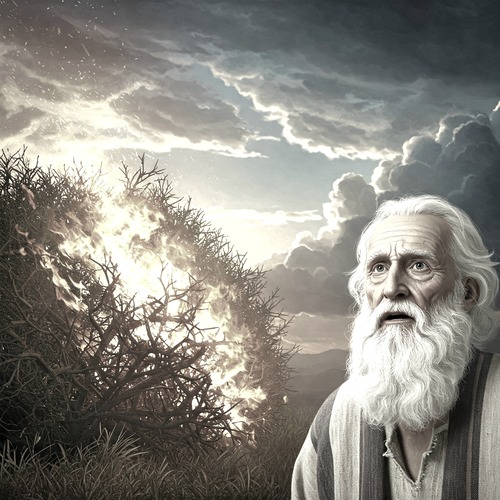When God Manifests in Fire: What Does the Symbolism Mean?
Throughout Scripture, God frequently reveals Himself to His people through the powerful symbol of fire. From the burning bush to Pentecost’s tongues of flame, divine fire appears at pivotal moments in redemptive history. But what exactly does the recurring imagery convey? Let’s explore the rich symbolism of divine fire through a Reformed theological lens.
THE HOLY PRESENCE: WHEN GOD MANIFESTS IN FIRE
When Moses encountered the burning bush in Exodus 3, he witnessed something extraordinary—a bush engulfed in flames yet not consumed. God called out, “Take off your sandals, for the place where you are standing is holy ground” (Exodus 3:5). This supernatural fire signalled God’s immediate presence.
Similarly, God led Israel through the wilderness with a pillar of fire by night (Exodus 13:21-22) and descended on Mount Sinai “in fire” (Exodus 19:18). In each instance, fire marked the place where heaven and earth met.
RC Sproul notes, “The symbolism of fire represents the mysterious, consuming holiness of God. It portrays God as utterly transcendent yet willingly present with His people.” This tension—between a God who is both transcendent and immanent—stands at the heart of Reformed theology’s emphasis on divine sovereignty and covenant relationship.
THE CONSUMING JUDGE: FIRE AS DIVINE JUDGMENT
Fire also symbolises God’s judgement throughout Scripture. The destruction of Sodom and Gomorrah came through “burning sulphur” raining down from heaven (Genesis 19:24). When Aaron’s sons Nadab and Abihu offered “unauthorised fire,” they were consumed by divine flames (Leviticus 10:1-2).
In the New Testament, John the Baptist warned the coming Messiah would separate wheat from chaff, “burning up the chaff with unquenchable fire” (Matthew 3:12). Revelation even culminates with final judgement in “the lake of fire” (Revelation 20:14-15).
John Calvin wrote, “God’s justice, when it once breaks forth, is like a raging fire, consuming all that opposes it.” The Reformed tradition emphasises this judgement flows not from divine caprice but from God’s perfect justice and holiness, which cannot abide sin.
THE REFINING SPIRIT: FIRE AS PURIFICATION
Not all divine fire consumes—some refines. When the seraph touched Isaiah’s lips with a burning coal, it purged his sin rather than destroying him (Isaiah 6:6-7). Peter later compared the testing of faith to gold refined by fire (1 Peter 1:7).
This purifying aspect appears in John the Baptist’s prophecy that Christ would “baptise you with the Holy Spirit and fire” (Matthew 3:11)—not merely to judge but to cleanse and transform.
JI Packer explains, “The fire of God purifies the believer, but only because Christ has already endured the fires of judgement in our place.” This reflects the Reformed emphasis on progressive sanctification as God’s continuing work in believers.
THE GUARDIAN FLAME: FIRE AS DIVINE PROTECTION
Perhaps most comforting is how God’s fire also protects His people. When Pharaoh’s army pursued the Israelites to the Red Sea, the pillar of fire stood between the two camps, bringing “darkness to the one side and light to the other” (Exodus 14:19-20). The very fire that threatened Egypt illuminated Israel’s path to safety.
In one of Scripture’s most dramatic demonstrations, Shadrach, Meshach, and Abednego were thrown into a furnace heated “seven times hotter than usual” (Daniel 3:19). Yet when Nebuchadnezzar looked in, he saw four men walking unharmed in the fire—the fourth was “like a son of the gods” (Daniel 3:25).
The prophet Zechariah proclaimed God’s promise to be “a wall of fire around [Jerusalem]” (Zechariah 2:5), showing how divine fire that consumes enemies simultaneously shields the covenant people.
Herman Bavinck, the Dutch Reformed theologian, observed, “The same fire that judges the wicked becomes for God’s people a protective barrier and warm comfort—not because they deserve better, but because of God’s covenant faithfulness.” This reflects the Reformed emphasis on God’s sovereign providence in preserving His elect.
THE EMPOWERING PRESENCE: FIRE AS DIVINE POWER
At Pentecost, “tongues of fire” rested on the disciples as they received the Holy Spirit (Acts 2:3-4). This heavenly fire didn’t consume or merely purify—it empowered for mission.
This recalls how God answered Elijah’s prayer on Mount Carmel with fire from heaven that consumed sacrifice, wood, stones, and water (1 Kings 18:38-39), demonstrating divine power that vindicated true worship against idolatry.
Jonathan Edwards, a leading Reformed theologian of the Great Awakening, described the Spirit’s work as “a flame of divine love” kindled in believers’ hearts. This flame doesn’t merely warm but energises God’s people for kingdom work and witness.
WHEN GOD MANIFESTS IN FIRE: HOW DO WE RESPOND?
How should we respond to this God who appears in fire? Scripture and Reformed theology suggest several responses:
- We cultivate reverent worship. As Hebrews reminds us, “Our God is a consuming fire” (Hebrews 12:29). True worship acknowledges both God’s transcendent holiness and His gracious condescension.
- We trust His refining work. When life’s trials come like fire, remember Peter’s words that such testing proves faith “genuine” (1 Peter 1:7). God’s refining fire burns away what is temporal to reveal what is eternal.
- We rest in His protection. The same fire that threatens God’s enemies becomes a shield for His people. As Charles Spurgeon, though Baptist but Reformed in soteriology, preached, “The furnace of affliction may be fierce, but if the presence of Christ is felt, no believer needs fear harm.”
- We seek Spirit-empowerment. The fire of Pentecost is available to all believers through the Spirit. As Calvin wrote, “The same Spirit who appeared in the form of tongues of fire now kindles the flame of heavenly life in us.”
CONCLUSION: WHEN GOD MANIFESTS IN FIRE
When God manifests in fire throughout Scripture, He reveals different facets of His character: His holy presence, righteous judgement, purifying love, faithful protection, and empowering Spirit. These aren’t contradictory symbols but complementary revelations of the same unchanging God.
Reformed theology helps us see the unity behind these fiery manifestations: a sovereign God accomplishing His redemptive purposes. For some, divine fire means judgement; for others—those covered by Christ’s sacrifice—it means purification, protection, and power.
As believers, we don’t need to fear the fire of God’s presence. Instead, like Moses, we can approach the burning bush with awe, remove our sandals on holy ground, and listen for the voice of the One who calls us by name from the midst of the flame.
WHEN GOD MANIFESTS IN FIRE: RELATED FAQs
Does the fire of God ever symbolise wrath without redemptive purpose? According to Reformed theologian Michael Horton, divine fire always serves God’s ultimate purposes, even in judgement. “The wrath of God against sin demonstrates His commitment to justice and the worth of His glory,” Horton explains. The Reformed tradition maintains even God’s most severe judgements reveal His character and advance His redemptive plan.
- How does divine fire relate to the concept of God’s glory? Reformed scholar Sinclair Ferguson notes fire often appears with God’s Shekinah glory, as in Ezekiel’s visions. “The burning coals and fire are manifestations of divine glory too powerful to behold directly,” Ferguson writes. This association between fire and glory reminds us God’s complete self-revelation would overwhelm fallen humans without His mediation.
- Why did Reformed churches historically reject prayer candles while affirming God’s fire symbolism? Many Reformed churches distinguished between biblical fire symbolism and human-made representations that might become objects of veneration. Abraham Kuyper explained this as maintaining the “spiritual worship” Reformed theology prizes. The concern was not with symbolism itself but with potential confusion between the symbol and the divine reality it represents.
Is there a connection between divine fire and the eternal state? While Revelation 21-22 describes heaven without need for sun or lamps, Reformed eschatology sees God’s unveiled glory itself as providing light. Anthony Hoekema suggested divine fire transforms from judgement to purification to illumination in the arc of redemptive history. The consuming fire becomes the light of glory in which the redeemed dwell eternally.
- How did the Puritans interpret the symbolism of divine fire in personal sanctification? Puritan divine Thomas Watson compared God’s sanctifying fire to a goldsmith’s forge that “separates the precious from the vile.” John Owen described the Holy Spirit’s work as a “gentle flame” that gradually transforms believers into Christ’s image. Puritans emphasised the patient endurance required during this refining process, viewing life’s trials as the heat necessary for spiritual formation.
- Did any Reformed thinkers connect divine fire to the doctrine of election? Dutch theologian Abraham Kuyper saw in Ezekiel’s vision of burning coals scattered over Jerusalem (Ezekiel 10) a picture of election. “As coals are selected from the larger fire, so God chooses some for mercy even amid judgement,” Kuyper wrote. Reformed theology often finds in fire imagery both the sovereign choice of God and the impossibility of thwarting His redemptive intentions.
How should Christians understand the “strange fire” of Nadab and Abihu in relation to worship? Reformed liturgist Hughes Oliphant Old viewed this account as teaching that authentic worship must arise from God’s revealed will, not human innovation. “The regulative principle of worship is grounded in the holiness of God,” Kevin DeYoung explains. When we approach God on our terms rather than His, we risk encountering His holiness as judgement rather than blessing.
WHEN GOD MANIFESTS IN FIRE: OUR RELATED POSTS
Editor's Pick

GPS Without Eyes: How Ants Silently Shout Intelligent Design
Picture a leafcutter ant navigating the rainforest floor in pitch darkness, carrying a leaf fragment 50 times its body weight. [...]

Born Broken: Why Must We Affirm Original Sin?
Imagine a world where we’re born neutral—free to choose good, and without a bias toward evil. Sounds appealing… until we [...]

Does God Truly Care About My Everyday Choices?
OWe believe God created the universe. We believe He orchestrated the exodus from Egypt and raised Jesus from the dead. [...]
SUPPORT US:
Feel the Holy Spirit's gentle nudge to partner with us?
Donate Online:
Account Name: TRUTHS TO DIE FOR FOUNDATION
Account Number: 10243565459
Bank IFSC: IDFB0043391
Bank Name: IDFC FIRST BANK






